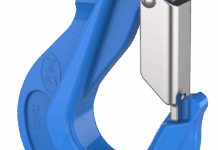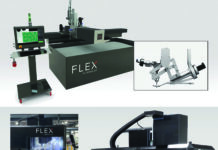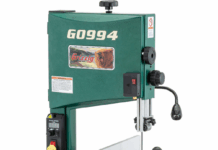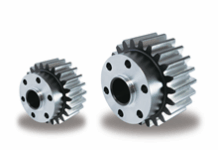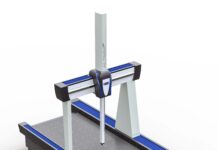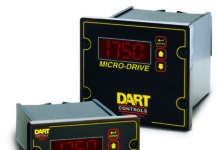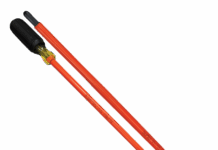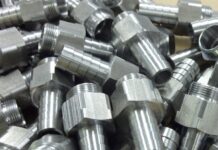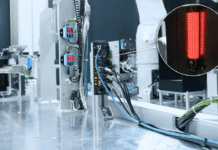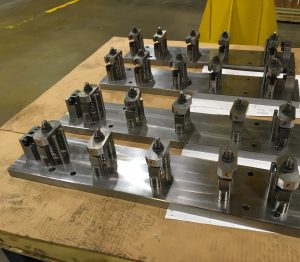 Modern CNC equipment is the gift that keeps on giving to American Manufacturing; it’s allowed machine shops all over the country to produce high-quality parts in a fraction of the time it used to take our grandparents’ lathes. However, even with the same high-tech equipment, not all machine shops are able to create the same results. That’s because the difference between an average machined part and a high tolerance component often comes down to fixturing.
Modern CNC equipment is the gift that keeps on giving to American Manufacturing; it’s allowed machine shops all over the country to produce high-quality parts in a fraction of the time it used to take our grandparents’ lathes. However, even with the same high-tech equipment, not all machine shops are able to create the same results. That’s because the difference between an average machined part and a high tolerance component often comes down to fixturing.
Though the process of designing, selecting, and implementing the right fixturing requires extra time, talent, and technology, US manufacturers, and their customers are discovering that the additional investment pays serious dividends.
How Custom, Dynamic Fixturing is a Game Changer in American Manufacturing
For many major equipment brands, an inferior part can sabotage the performance of an entire machine, damaging both bottom lines and global reputations. In these cases, precision isn’t just an expectation, it’s a mandate. Thanks to today’s technology, improved surface finishes, and tighter tolerances are possible with the right people, tools, and strategies in place. One of the ways to achieve such superior levels of accuracy is by using specially designed fixturing for complex parts.
Fixturing or workholding devices are just as important to the production of precision parts as machining and tooling process. They keep part after part in position so that each finished product falls within a few thousandths of an inch of the desired specs. Fixturing selection also requires additional time and expertise that not every machine shop is cut out for — and that’s why US-based complex part manufacturers like Allis Roller are able to make a name for themselves in the niche of high tolerance applications.
President and CEO of Allis Roller, Dave Dull, put it succinctly: “Anyone can order a CNC lathe or robotic welder. Not everyone wants to take things to the next level with custom fixturing.”
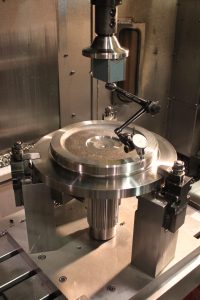 At Allis Roller, custom fixture design is developed in collaboration with a full bench of engineers, die makers, and research and development experts. To produce the kind of precision results Dull expects at his operation, highly skilled machinists use stand-alone fixturing for many parts. This has required a significant investment in people and technology, but for this manufacturer, it has more than paid off in their ability to maintain customer satisfaction. It’s common in custom machining and welding for materials to shift unexpectedly, and adjustments have to be made in real-time in order to preserve tolerance. To keep production moving, Allis Roller’s fixturing team is available on the spot to make any necessary changes and maintain standards.
At Allis Roller, custom fixture design is developed in collaboration with a full bench of engineers, die makers, and research and development experts. To produce the kind of precision results Dull expects at his operation, highly skilled machinists use stand-alone fixturing for many parts. This has required a significant investment in people and technology, but for this manufacturer, it has more than paid off in their ability to maintain customer satisfaction. It’s common in custom machining and welding for materials to shift unexpectedly, and adjustments have to be made in real-time in order to preserve tolerance. To keep production moving, Allis Roller’s fixturing team is available on the spot to make any necessary changes and maintain standards.
This is how operations like Allis Roller have been able to earn the loyalty of Fortune 500 companies and has allowed Allis Roller to purchase three new CNC Machining Centers for delivery by the end of 2019.
Custom, Dynamic Fixturing is Scalable and Technologically Advanced
Dynamic fixturing practices and methods are as diverse as the wide range of parts they serve. Depending on their specialty, some operations find it more cost-effective to provide a degree of customization without employing a full team of engineers. To streamline the manufacturing process, others will reuse custom fixturing for repeat orders once their customers have come to depend on a certain level of quality. The strategy used depends entirely on the needs of the application.
One method, known as modular fixturing, uses a system of interchangeable components designed to secure a given workpiece during a machining process. Modular fixturing is ideal for use in hole making equipment, such as horizontal or vertical machining centers. As CNC lathes become increasingly versatile machines, flexible solutions like modular fixturing also help to maintain quality from one unique part to the next.
This form of dynamic fixturing provides needed customization without creating custom workholdings for each new part. As long as the application doesn’t require a high level of custom engineering, modular fixturing systems can help streamline the process of machining precision parts. They can also be used for both high volume and low volume work to keep an operation moving from one job to the next with very little work stoppage or additional set up.
Using CNC equipment to fashion entirely custom fixturing can also streamline the machining process and improve accuracy because automated fixturings are able to produce exact tolerance per the customer’s specifications. The level of precision afforded by computerized fixturing also assures the customer that each new order will measure up to the same specs as the last. Consistent complex parts eventually power equally reliable machinery, allowing international brands to promise a high level of performance and longevity to their own customer base. For US-based machine shops carving out their own niche in a crowded manufacturing market, this benefit is key to their success with globally renowned equipment manufacturers.
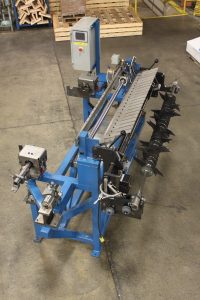 Even with the benefit of the latest technology, some operations still rely heavily on people to produce the kinds of custom fixturing needed for more complex parts. For each new complex component, Allis Roller assembles a project team consisting of engineering, tool room, die making, and manufacturing departments. This team works together to ensure that the entire manufacturing process goes smoothly from start to finish, and that includes accounting for fixturing integration and adjustment. An individual welder’s skill is also imperative for achieving optimal penetration and a lack of inclusions in custom fixturing production. By combining the built-in adjustability and precision of CNC equipment with a high level of fixturing experience, complex parts manufacturers can maximize results, while keeping processes lean and cost-effective.
Even with the benefit of the latest technology, some operations still rely heavily on people to produce the kinds of custom fixturing needed for more complex parts. For each new complex component, Allis Roller assembles a project team consisting of engineering, tool room, die making, and manufacturing departments. This team works together to ensure that the entire manufacturing process goes smoothly from start to finish, and that includes accounting for fixturing integration and adjustment. An individual welder’s skill is also imperative for achieving optimal penetration and a lack of inclusions in custom fixturing production. By combining the built-in adjustability and precision of CNC equipment with a high level of fixturing experience, complex parts manufacturers can maximize results, while keeping processes lean and cost-effective.
At the end of the day, the quality of the fixture dictates the manufacturer’s ability to reuse it down the road for renewed parts orders and directly impacts the customer’s bottom line. High tolerance parts machining forces manufacturers to strike a delicate balance between quality and speed, and the use of custom, dynamic fixturing is how it’s done.






